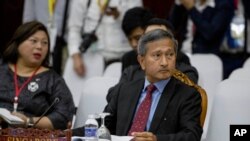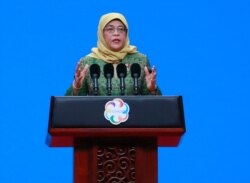In March, China had a disagreement with the Philippines on whether it had donated accurate COVID-19 test kits. In April a Chinese newspaper complained Vietnam put China in an “embarrassing situation” by stopping flights between their nations to curb the virus.
And Malaysia protested a Chinese ship appearing in the disputed South China Sea, some fearing Beijing acted while the world is busy with the pandemic.
However in contrast to the march of diplomatic stumbles, there appears to be a relative bright spot for China in Southeast Asia: Singapore.
The island nation has donated millions of dollars and supplies to China’s virus response, vowed to conduct joint vaccine research, and celebrated 30 years of diplomatic relations.
“Singapore stands in solidarity with China,” Singapore’s President Halimah Yacob said in a letter to her Chinese counterpart, Xi Jinping, early in the pandemic. She said his “swift, decisive and comprehensive measures” would help “overcome COVID-19 with strength and fortitude.”
Though Singapore’s Prime Minister Lee Hsien Loong has called it unhelpful for China and the U.S. to blame each other for the virus, researcher Sophie Boisseau du Rocher questions if Southeast Asia is willing to blame China, where the virus originated.
She argued the region’s dependence on China has made its leaders reluctant to seem critical amid the crisis.
“Although China posed a threat to Southeast Asia by mishandling the initial outbreak of the crisis, no blame was publicly expressed in the region,” du Rocher, a senior research fellow at the Center for Asian Studies at the French Institute of International Relations, wrote in The Diplomat.
Citing examples from Singapore’s prime minister to Myanmar’s President U Win Myint, she said leaders across Southeast Asia have made a point to applaud Xi’s emergency response.
While du Rocher described this as a regional trend, Vriens & Partners pointed to a warming of ties between Singapore and China in particular amid the crisis. The consulting firm wrote in an analysis that Singapore’s donations to China were a rare instance of “checkbook diplomacy” from the micro-state.
Singapore’s prime minister, when asked about Washington’s attempt to pin the pandemic on Beijing, said instead it is “most constructive” to focus on solutions. Besides China, Lee noted that other nations have struggled to contain the virus, as well.
“I don't think overall that one can say this would not have happened if only the Chinese had done the right thing,” he said on CNN at the end of March. “Because you look at the way the outbreak has continued, grown and spread in many countries.”
China is the biggest trade partner for Singapore, with two-way commerce valued at 137 billion Singapore dollars in 2019. With a history of cultural ties, 75% of Singapore’s citizens are ethnic Chinese.
When citizens were asked which foreign nation or organization had the most economic influence in the region, there was no competition. Nearly 70% of people said the answer was China, followed by the United States and then the Association of Southeast Asian Nations, according to a 2019 survey from the ISEAS-Yusof Ishak Institute in Singapore.
The influence is expected to increase. When asked about Beijing’s future role as a major power, 57% agreed with the statement, “China will become a revisionist power with an intent to turn Southeast Asia into its sphere of influence.” Other options were that China could be an alternative to U.S. power or be a benign power.






